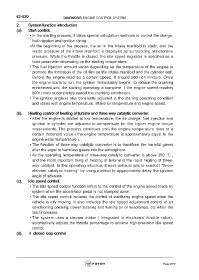Page 2572 - Foton Workshop Manual - Sauvana
P. 2572
62-520 DIAGNOSIS-ENGINE CONTROL SYSTEM
2. System function introduction
(a). Start control.
• In the starting process, it takes special calculation methods to control the charge,
fuel injection and ignition timing.
•At the beginning of the process, the air in the intake manifold is static, and the
inside pressure of the intake manifold is displayed as surrounding atmospheric
pressure. While the throttle is closed, the idle speed regulator is specified as a
fixed parameter depending on the starting temperature.
• The fuel injection amount varies depending on the temperature of the engine to
promote the formation of the oil film on the intake manifold and the cylinder wall.
Before the engine reaches a certain speed, it should add rich mixture. Once
the engine starts to run, the system immediately begins to reduce the cranking
enrichment until the starting operating is complete ( the engine speed reaches
800r / min) to completely cancel the cranking enrichment.
• The ignition angle is also constantly adjusted in the starting operating condition
and varies with engine temperature, intake air temperature and engine speed.
(b). Heating control of heating of turbine and three-way catalytic converter.
• After the engine is started at low temperature, the air charge, fuel injection and
ignition in cylinder are adjusted to compensate for the higher engine torque
requirements. The process continues until the engine temperature rises to a
certain threshold value ( the engine temperature is approximately equal to the
engine water temperature ).
• The function of three-way catalytic converter is to transform the harmful gases
after the expel to harmless gases into the atmosphere.
• As the operating temperature of three-way catalytic converter is above 300 ℃ ,
and the most important thing of heating of turbine is the rapid heating of three-
way catalyst. In this operating situation, it uses exhaust gas to conduct "three-
element catalytic heating" by using method to appropriately delay the ignition
angle of advance.
(c). Idle speed control.
• The idle speed control function refers to the control of the engine speed made by
system when the accelerator pedal is not stamped down.
• The idle speed control includes the control of stabilizing engine speed when the
vehicle is idly moving. It also includes the idle speed adjustment control of air
conditioning opening, power steering and turning on of headlamps, etc when the
load increases.
• The system uses a stepper motor ( integrated in electronic throttle valve),
automatically adjusts the throttle percentage to achieve high-precision idle speed
control.
(d). λ closed-loop control
Page 2572

